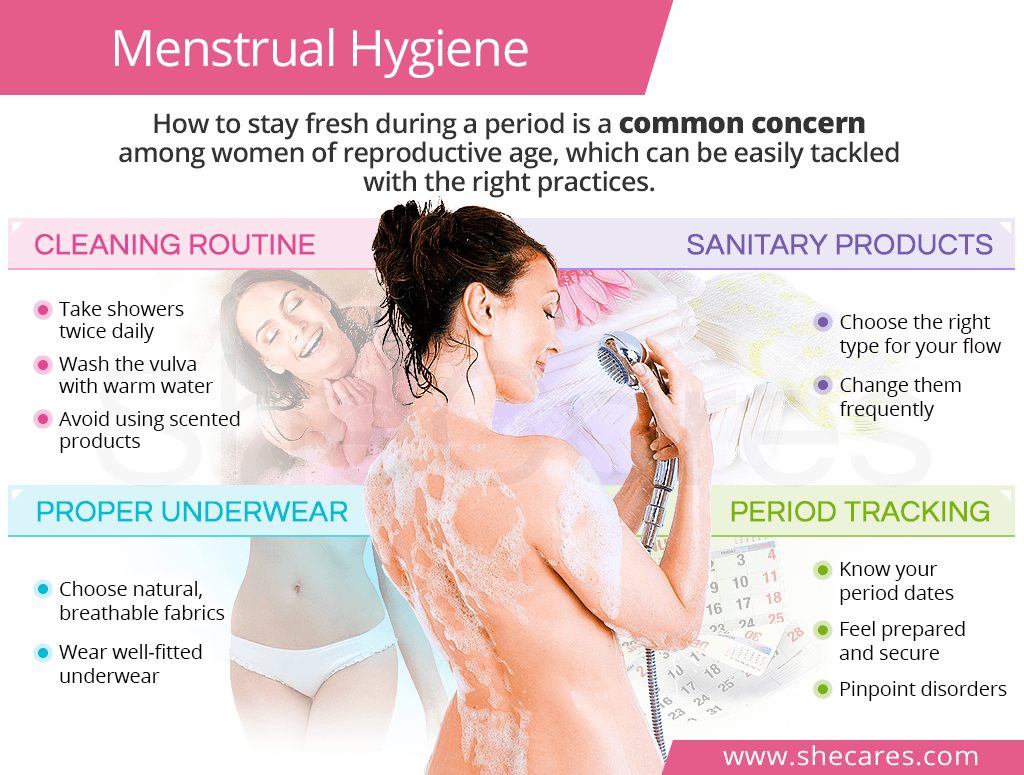Cleaning Practices for Menstrual Hygiene
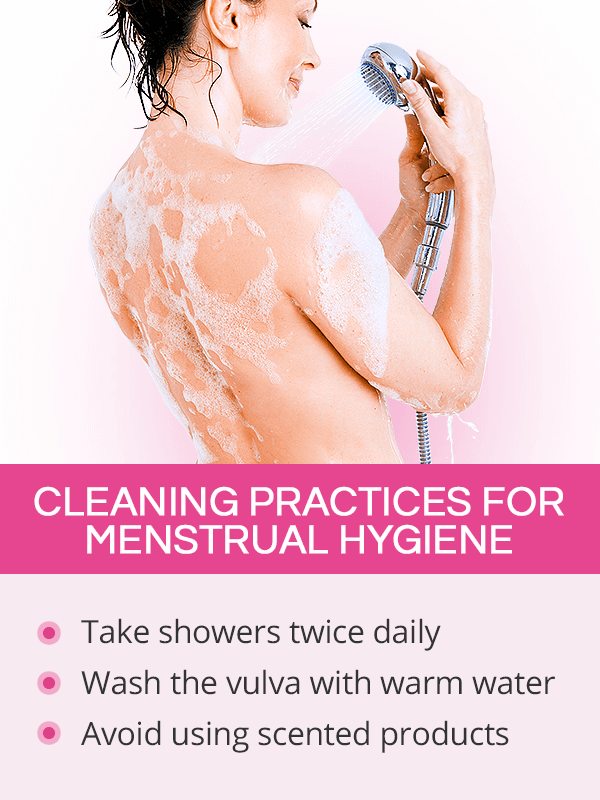
How to stay fresh during a period starts with properly cleaning oneself. There are two components to creating a healthy menstrual hygiene routine: frequent washing and the right cleansing products.
While daily showers should be anyone's standard, women are advised to shower at least twice a day while on a period.Those with heavy periods might need to wash more frequently. It is also key to avoid douching and wash from front to back to prevent bacteria from the anus entering the vagina and causing infections.1
It might be tempting to buy fragrant cleaning products, but washing the vulva only with warm water is the recommended way to stay clean while on a period.2 The vagina is self-cleaning, and scented products can disrupt its flora and cause irritations. When on the go, women may keep water wipes on hand to maintain freshness.
Sanitary Products for Menstrual Hygiene
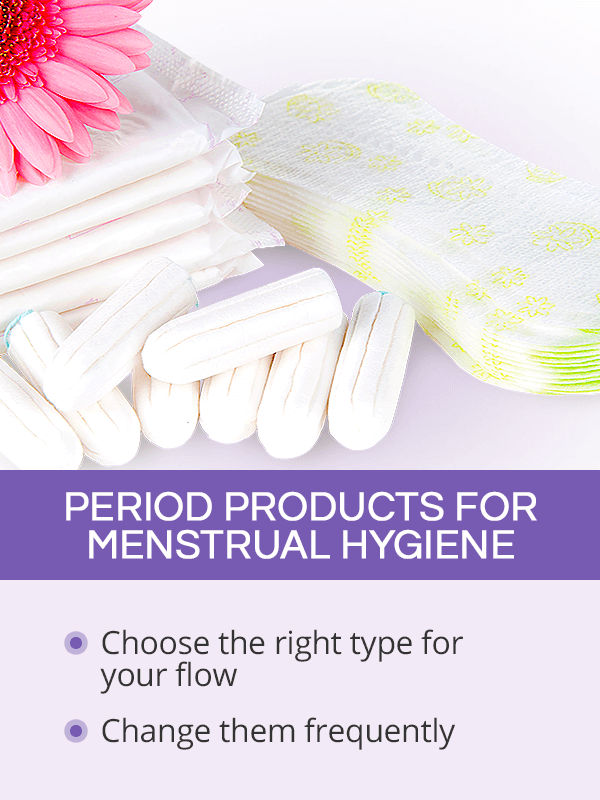
When it comes to the topic of period products, there are two issues to consider: the types of products to choose as well as the frequency with which to change them in order to maintain proper menstrual hygiene.
Sanitary products come in a rich variety of types, shapes, and prices. A woman's choice will depend upon several factors, such as preference, lifestyle, period flow, or reproductive plans, among others. While pads and tampons are by far the most popular options, menstrual cups have also risen in fame in the recent years.
Regardless of their type, sanitary products should be changed frequently for optimal period hygiene, between three to twelve hours depending on their types.3 This can not only prevent accidental leakage, but also help avoid lingering smells and bacterial infections resulting from accumulated period blood.
Proper Underwear for Menstrual Hygiene
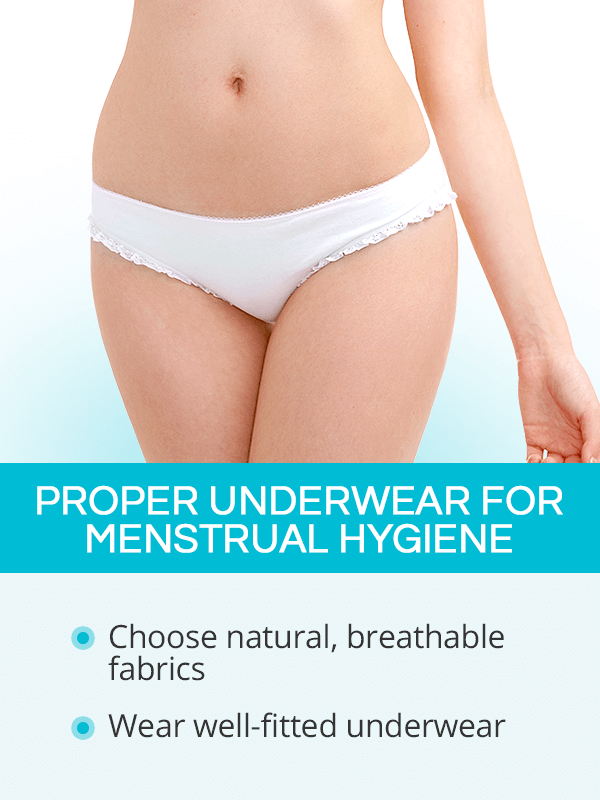
Equally important to frequent washing and using adequate sanitary products is wearing the right underwear, which boils down to two factors: adequate fabrics and a period-friendly fit.
For the best period hygiene, women should choose underwear made with natural, breathable fabrics, such cotton, that wick away moisture.4 Also, various brands offer specially designed period underwear, marketing it for comfort, stain-resistance, high absorbency, and leak-proof features.
When it comes to choosing the right fit, the ultimate choice will depend on a woman's lifestyle, flow, and preference. Most opt for well-fitted, full coverage underwear that makes them feel comfortable and protected while on a period, especially during the night when most leaks tend to happen.
Period Tracking for Menstrual Hygiene
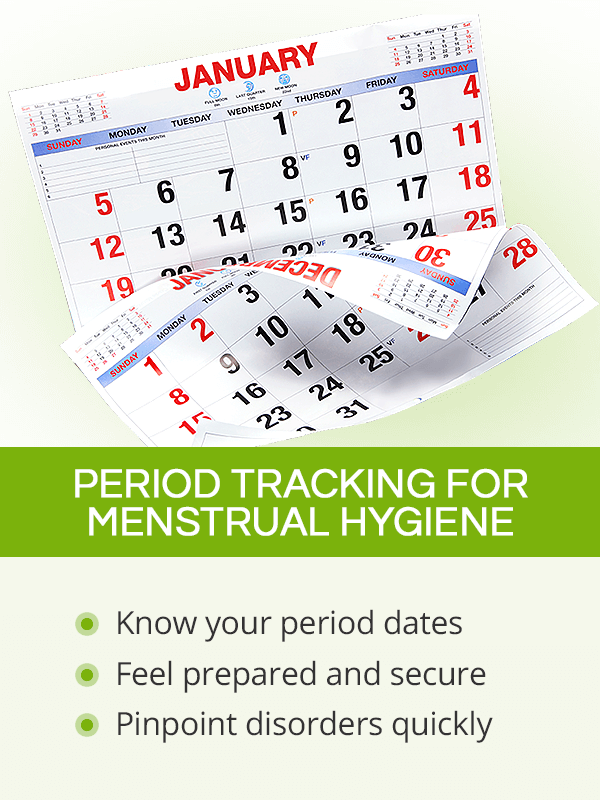
Although being surprised by a period's arrival is a foreign concept for many women, those who do not track cycles or suffer with menstrual irregularities know the struggle all too well.
The best way to be prepared and stay fresh during a period is to know when it comes, which can be done by tracking one's period patterns, either manually in a calendar or by using a period tracker. Besides menstrual hygiene, period tracking also helps women planning to get pregnant identify their most fertile days.
Additionally, tracking periods may help women take note of abnormal symptoms, such as heavy periods, scanty flow, or intermenstrual bleeding, which might be indicative of menstrual disorders and may make it harder to maintain good period hygiene.
Additional Recommendations
A woman's menstruation depends on her hormone levels, which can be disrupted by poor diet, abnormal weight, prolonged stress, and other factors. As such, it is key to put efforts into maintaining healthy menstruation to prevent potential disorders from settling in and make period hygiene harder to uphold.
This can consist of eating a well-balanced diet with wholesome sources of healthy fats, lean protein, and complex carbs. It can also include natural supplements for hormonal imbalance, such as phytoestrogenic supplements, like chasteberry, or hormone-regulating supplements, like Macafem.
Lastly, finding help to quit addictions to nicotine and alcohol as well as relieving stress with yoga, deep breathing, or meditation are essential steps on the route to proper menstrual hygiene and health.
Key Takeaways
How to stay fresh during a period is a common concern among women of reproductive age. However, the importance of hygiene during menstruation extends past feeling fresh and clean. It is also necessary for the prevention of irritations and infections that might negatively affect women's health. Fortunately, proper menstrual hygiene can be maintained by implementing four practices: frequent washes with warm water, while avoiding harsh, perfumed cleaning products; choosing the right sanitary supplies and changing them frequently to prevent unpleasant smells; wearing well-fitted underwear made with natural, breathable fabrics; and making it a habit to track one's periods to stay prepared. With these tips, keeping up with personal hygiene during menstruation is easy.
Sources
- Healthy Women. (2019). Feminine Hygiene Tips. Retrieved May 6, 2020 from https://www.healthywomen.org/content/article/feminine-hygiene-tips
- Healthy Women. (2017). Mistakes you're making during your period. Retrieved May 6, 2020 from https://www.healthywomen.org/content/article/mistakes-youre-making-during-your-period
- Indian Journal of Community Medicine. (2008). Menstrual Hygiene: How Hygienic is the Adolescent Girl? Retrieved May 6, 2020 from https://www.ncbi.nlm.nih.gov/pmc/articles/PMC2784630/
- Journal of Environmental and Public Health. (2018). Menstrual Hygiene, Management, and Waste Disposal. Retrieved May 6, 2020 from https://www.ncbi.nlm.nih.gov/pmc/articles/PMC5838436/
- Obstetrics & Gynecology and Reproductive Biology. (2003). An epidemiological survey of vulvovaginal candidiasis in Italy. Retrieved May 6, 2020 from https://www.ejog.org/article/S0301-2115(03)00096-4/abstract
- University of Iowa Hospitals & Clinics. (2020). Vulvar skin care guidelines. Retrieved May 6, 2020 from https://uihc.org/health-topics/vulvar-skin-care-guidelines
Footnotes:
- NHS. (2018). Keeping your vagina clean and healthy. Retrieved May 6, 2020 from https://www.nhs.uk/live-well/sexual-health/keeping-your-vagina-clean-and-healthy/
- Office on Women's Health. (2019). Douching. Retrieved May 6, 2020 from https://www.womenshealth.gov/a-z-topics/douching
- The University of Texas at Austin. (n.d.). Retrieved May 6, 2020 from https://uthealthaustin.org/blog/period-products
- Cleveland Clinic. (2018). Vulvar care. Retrieved May 6, 2020 fromhttps://my.clevelandclinic.org/health/articles/4976-vulvar-care
